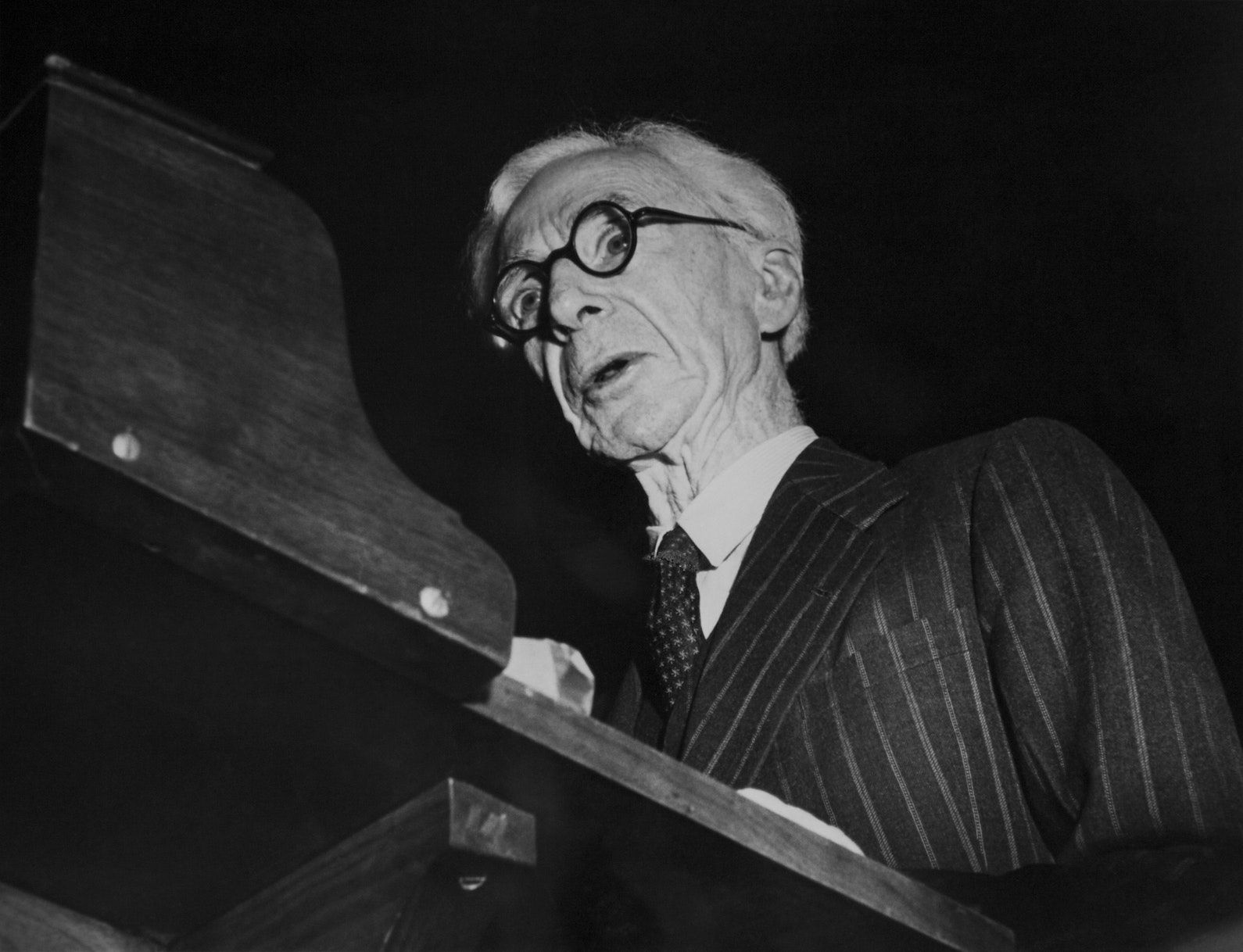by Bertrand Russell
I am writing on this occasion not as a Briton, not as a European, not as a member of a Western democracy, but as a human being, a member of the species Man, whose continued existence is in doubt. The world is full of conflicts: Jews and Arabs; Indians and Pakistanis; white men and Negroes in Africa; and, overshadowing all minor conflicts, the titanic struggle between Communism and anti-Communism.
Almost everybody who is politically conscious has strong feelings about one or more of these issues; but I want you, if you can, to set aside such feelings for the moment and consider yourself only as a member of a biological species which has had a remarkable history and whose disappearance none of us can desire. I shall try to write no single word which should appeal to one group rather than to another. All, equally, are in peril, and, if the peril is understood, there is hope that they may collectively avert it. We have to learn to think in a new way. We have to learn to ask ourselves not what steps can be taken to give military victory to whatever group we prefer, for there no longer are such steps. The question we have to ask ourselves is: What steps can be taken to prevent a military contest of which the issue must be disastrous to all sides?
The general public, and even many men in positions of authority, have not realized what would be involved in a war with hydrogen bombs. The general public still thinks in terms of the obliteration of cities. It is understood that the new bombs are more powerful than the old and that, while one atomic bomb could obliterate Hiroshima, one hydrogen bomb could obliterate the largest cities such as London, New York, and Moscow. No doubt in a hydrogen-bomb war great cities would be obliterated. But this is one of the minor disasters that would have to be faced. If everybody in London, New York, and Moscow were exterminated, the world might, in the course of a few centuries, recover from the blow. But we now know, especially since the Bikini test, that hydrogen bombs can gradually spread destruction over a much wider area than had been supposed. It is stated on very good authority that a bomb can now be manufactured which will be 25,000 times as powerful as that which destroyed Hiroshima. Such a bomb, if exploded near the ground or underwater, sends radioactive particles into the upper air. They sink gradually and reach the surface of the earth in the form of a deadly dust or rain. It was this dust which infected the Japanese fishermen and their catch of fish although they were outside what American experts believed to be the danger zone. No one knows how widely such lethal radioactive particles might be diffused, but the best authorities are unanimous in saying that a war with hydrogen bombs is quite likely to put an end to the human race. It is feared that if many hydrogen bombs are used there will be universal death—sudden only for a fortunate minority, but for the majority a slow torture of disease and disintegration.
I will give a few instances out of many. Sir John Slessor, who can speak with unrivaled authority from his experiences of air warfare, has said: “A world war in this day and age would be general suicide”; and has gone on to state: “It never has and never will make any sense trying to abolish any particular weapon of war. What we have got to abolish is war.” Lord Adrian, who is the leading English authority on nerve physiology, recently emphasized the same point in his address as president of the British Association. He said: “We must face the possibility that repeated atomic explosions will lead to a degree of general radioactivity which no one can tolerate or escape”; and he added: “Unless we are ready to give up some of our old loyalties, we may be forced into a fight which might end the human race.” Air Chief Marshal Sir Philip Joubert says: “With the advent of the hydrogen bomb, it would appear that the human race has arrived at a point where it must abandon war as a continuation of policy or accept the possibility of total destruction.” I could prolong such quotations indefinitely.
Many warnings have been uttered by eminent men of Science and by authorities in military strategy. None of them will say that the worst results are certain. What they do say is that these results are possible and no one can be sure that they will not be realized. I have not found that the views of experts on this question depend in any degree upon their politics or prejudices. They depend only, so far as my researches have revealed, upon the extent of the particular expert’s knowledge. I have found that the men who know most are most gloomy.
Stark, Inescapable Problem
Here, then, is the problem which I present to you, stark and dreadful and inescapable: Shall we put an end to the human race; or shall mankind renounce war? People will not face this alternative because it is so difficult to abolish war. The abolition of war will demand distasteful limitations of national sovereignty. But what perhaps impedes understanding of the situation more than anything else is that the term “mankind” feels vague and abstract. People scarcely realize in imagination that the danger is to themselves and their children and their grandchildren, and not only to a dimly apprehended humanity. And so they hope that perhaps war may be allowed to continue provided modern weapons are prohibited. I am afraid this hope is illusory. Whatever agreements not to use hydrogen bombs had been reached in time of peace, they would no longer be considered binding in time of war, and both sides would set to work to manufacture hydrogen bombs as soon as war broke out, for if one side manufactured the bombs and the other did not, the side that manufactured them would inevitably be victorious.
On both sides of the Iron Curtain there are political obstacles to emphasis on the destructive character of future war. If either side were to announce that it would on no account resort to war, it would be diplomatically at the mercy of the other side. Each side, for the sake of self-preservation, must continue to say that there are provocations that it will not endure. Each side may long for an accommodation, but neither side dare express this longing convincingly. The position is analogous to that of duelists in former times. No doubt it frequently happened that each of the duelists f eared death and desired an accommodation, but neither could say so, since, if he did, he would be thought a coward. The only hope in such cases was intervention by friends of both parties suggesting an accommodation to which both could agree at the same moment. This is an exact analogy to the present position of the protagonists on either side of the Iron Curtain. If an agreement making war improbable is to be reached, it will have to be by the friendly offices of neutrals, who can speak of the disastrousness of war without being accused of advocating a policy of “appeasement.” The neutrals have every right, even from the narrowest consideration of self-interest, to do whatever lies in their power to prevent the outbreak of a world war, for if such a war does break out, it is highly probable that all the inhabitants of neutral countries, along with the rest of mankind, will perish. If I were in control of a neutral government, I should certainly consider it my paramount duty to see to it that my country would continue to have inhabitants, and the only way by which I could make this probable would be to promote some kind of accommodation between the powers on opposite sides of the Iron Curtain.
I, personally, am of course not neutral in my feeling and I should not wish to see the danger of war averted by an abject submission of the West. But, as a human being, I have to remember that, if the issues between East and West are to be decided in any manner that can give any possible satisfaction to anybody, whether Communist or anti-Communist, whether Asian or European or American, whether white or black, then these issues must not be decided by war. I should wish this to be understood on both sides of the Iron Curtain. It is emphatically not enough to have it understood on one side only. I think the neutrals, since they are not caught in our tragic dilemma, can, if they will, bring about this realization on both sides. I should like to see one or more neutral powers appoint a commission of experts, who should all be neutrals, to draw up a report on the destructive effects to be expected in a war with hydrogen bombs, not only among the belligerents but also among neutrals. I should wish this report presented to the governments of all the Great Powers with an invitation to express their agreement or disagreement with its findings. I think it possible that in this way all the Great Powers could be led to agree that a world war can no longer serve the purposes of any of them, since it is likely to exterminate friend and foe equally and neutrals likewise.
As geological rime is reckoned, Man has so far existed only for a very short period—1,000,000 years at the most. What he has achieved, especially during the last 6,000 years, is something utterly new in the history of the Cosmos, so far at least as we are acquainted with it. For countless ages the sun rose and set, the moon waxed and waned, the stars shone in the night, but it was only with the coming of Man that these things were understood. In the great world of astronomy and in the little world of the atom, Man has unveiled secrets which might have been thought undiscoverable. In art and literature and religion, some men have shown a sublimity of feeling which makes the species worth preserving. Is all this to end in trivial horror because so few are able to think of Man rather than of this or that group of men? Is our race so destitute of wisdom, so incapable of impartial love, so blind even to the simplest dictates of self-preservation, that the last proof of its silly cleverness is to be the extermination of all life on our planet?—for it will be not only men who will perish, but also the animals, whom no one can accuse of Communism or anti-Communism.
I cannot believe that this is to be the end. I would have men forget their quarrels for a moment and reflect that, if they will allow themselves to survive, there is every reason to expect the triumphs of the future to exceed immeasurably the triumphs of the past. There lies before us, if we choose, continual progress in happiness, knowledge, and wisdom. Shall we, instead, choose death, because we cannot forget our quarrels? I appeal, as a human being to human beings: remember your humanity, and forget the rest. If you can do so, the way lies open to a new Paradise; if you cannot, nothing lies before you but universal death.
Man’s Peril from the Hydrogen Bomb, BBC radio broadcast, 23 December 1954




